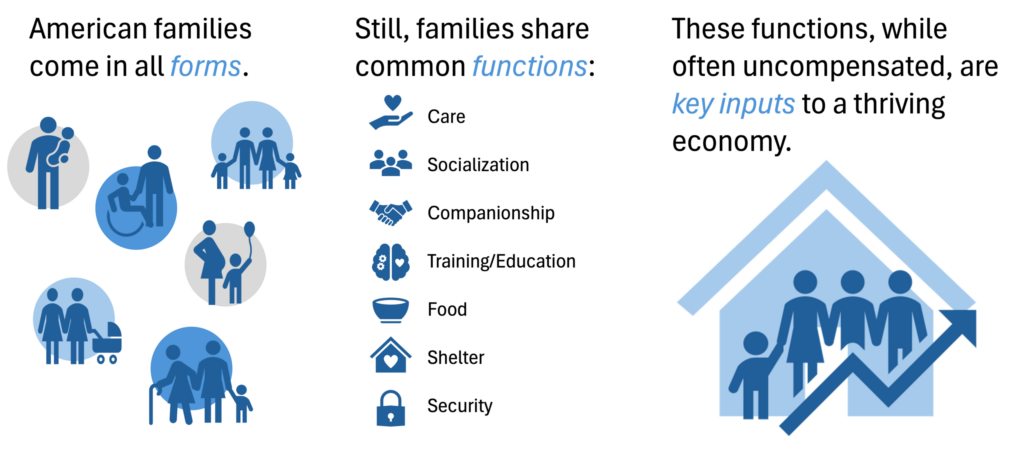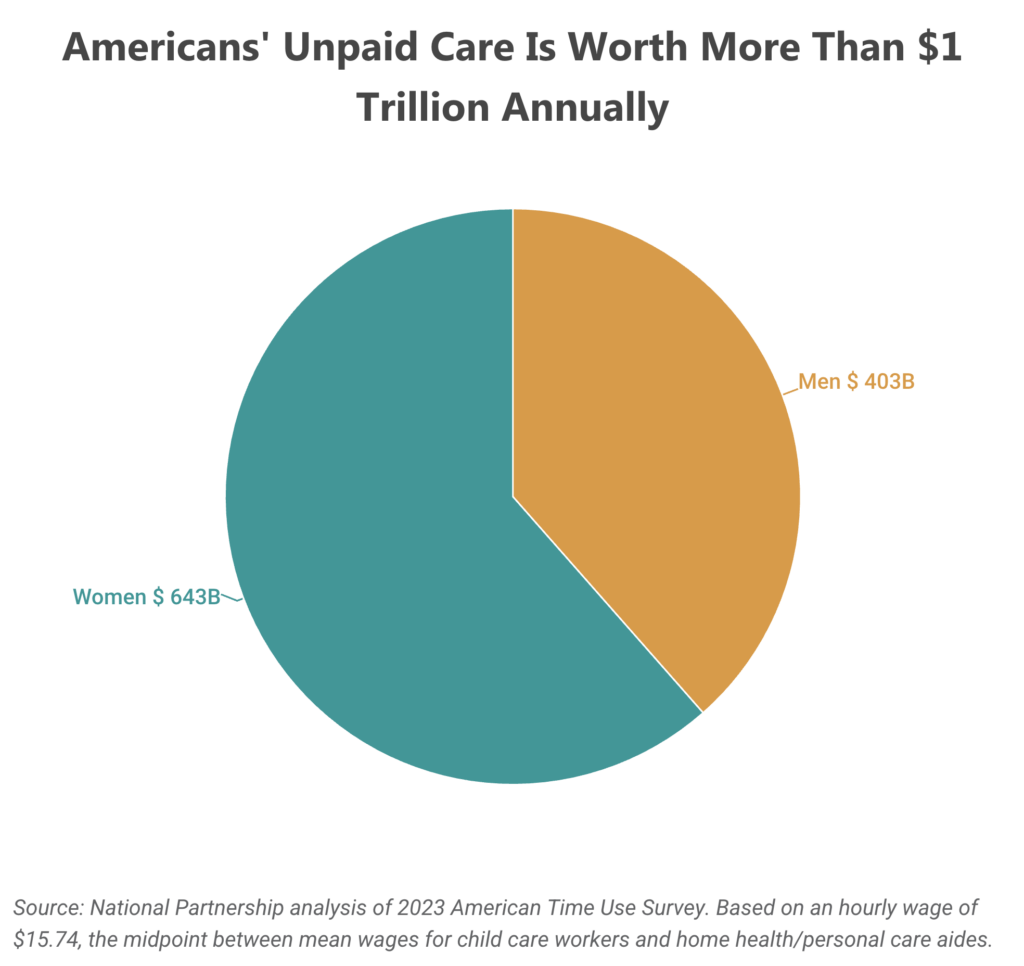We need to reframe our idea of the family. Too often, policymakers treat family policy as a series of entitlements. The family is seen as a cost center and a drain on the economy. Those on the left avoid framing policy as “family policy” to avoid defining what the “family” is and its traditional connotations. Focusing on a suite of individual policy initiatives (paid parental leave, universal child care, health care, etc.) leaves the left with a disjointed “to-do” list of government interventions without a clear moral imperative or identity. Just as conservatives were able to control the Carter Administrations’ 1980 Conference on Families with wedge issues like abortion, the right continues take the moral high ground when it comes to families–with the Moral Majority then and the MAGA movement now.
Those on the right, however, may conveniently allocate responsibilities to the family when abdicating government responsibility. Using issues like abortion and trans kids in sports, the political right has successfully motivated conservatives with traditional family values to stand up for traditional family values, while at the same time voting against free school lunches, WIC, and social safety nets for families that desperately need them. School board meetings during COVID escalated with cries of government overreach and angered citizens advocating for parents’ rights. Rick Santorum’s 2005 book It Takes a Family was a response to Hillary Clinton’s 1994 book It Takes a Village, saying liberal policies were at the root of dismantling the family structure. Big government is frequently portrayed as the family’s biggest foe.
But what the political left and the right miss in their debates is the immense productivity that happens within families and in service of families. Productivity that is crucial to a thriving economy. What if the family is a critical industry instead of a liability? What if the American family needs the next bailout, not failing corporations?
We fail to acknowledge the critical role families play in shaping our society. The productivity occurring within and in service of families across the country are necessary inputs to a growing economy. Every input to the economy, down to each individual worker, came from some form of family. Families turn babies into workers and often give workers a reason to work. Yet the work done within a family never receives a paycheck, cannot be declared on a W2, and is not considered in the calculation of the GDP.

While families in America come in many different forms, they still perform common functions. These functions, while often unrecognized and uncompensated, are integral to our society and economic wellbeing. The grand investment of raising children, for example, includes the basics of caregiving like sheltering, feeding, and clothing them, but it also provides socialization, education, and training for how to function in society. The primary understanding of values, morality, and ethics starts at home. We consider productive members of society wage earners–but what about the work required to shape children into employable workers? Or to care for workers once they have aged out of the workforce?

In an analysis of Bureau of Labor Statistics’ data, The National Partnership for Women & Families (NPWF) found Americans’ unpaid care work is worth over $1 trillion annually. $643 billion of that trillion is performed by women. NPWF states that this estimate is probably conservative, as unpaid, domestic work often includes multitasking. Imagine if families were compensated for even a fraction of this work.
Ironically, while we expect families to perform all these functions without collecting a living wage, the outsourcing of these functions is compensated and considered in GDP. Even when performed outside the household, the NPWF study shows care work is still often unpaid. When asked during the 2024 general election what his solution would to support families, JD Vance replied, “maybe grandma and grandpa [want] to help out a little bit more, or maybe there’s an aunt or uncle that wants to help out a little bit more. If that happens, you relieve some of the pressure on all the resources that we’re spending on day care.” His solution: more unpaid, unrecognized care work.
What Families Need
Families are already expected to do too much. The nuclear family has never been sufficient to fully execute all its key functions in their entirety, as Stephanie Coontz writes in her book, The Way We Never Were: American Families and the Nostalgia Trap. Urie Bronfenbrenner’s explored the roles different environments have in human development in his Social Ecological Model: a person’s environment is made up of several ecologies of care–from the microecology of a family to broader ecologies like neighborhoods, schools, and institutions. Each of these ecologies play a role in shaping human development. With the collapse of many of these centers of belonging (churches, neighborhoods, etc.) families have been left to fend for themselves when they need support.
Though society reaps the benefits from families’ providing their core functions, the government, corporations, and institutions bear limited responsibility when families fall short. Policies are rarely crafted with the holistic needs and productivity of a family in mind. Programs are often tailored to narrowly address a specific issue for individuals or households, assuming the family benefits will fall into place. Policymakers need to consider the full complexity of family functions and the multiple roles families play. A strength-based, family-centered approach to policy addresses the needs and contributions of each family member and considers its impact across generations.
The Center for the American Family seeks to fill the family policy void by providing evidence-based, non-partisan research and education focused solely on the American family, from birth to beyond retirement. The Center for American Families (CAF) is a nonpartisan, nonprofit think tank dedicated to supporting and strengthening American families.
Sources
Fry, Richard. “In a Growing Share of U.S. Marriages, Husbands and Wives Earn about the Same.” Pew Research Center, Pew Research Center, 13 Apr. 2023, www.pewresearch.org/social-trends/2023/04/13/in-a-growing-share-of-u-s-marriages-husbands-and-wives-earn-about-the-same/#:~:text=work%20is%20ideal.-,The%20earnings%20landscape%20of%20marriages%20today,husband%20was%20the%20sole%20provider.
Gallagher Robbins, Katherine, and Jessica Mason. Https://Nationalpartnership.Org/Americans-Unpaid-Caregiving-Worth-1-Trillion-Annually-Women-Two-Thirds-Work/, 27 June 2024.
Levin, Bess. “JD Vance Says the Solution to the Childcare Crisis Is to Have Grandparents Do It for Free.” Vanity Fair, Vanity Fair, 5 Sept. 2024, www.vanityfair.com/news/story/jd-vance-solution-childcare-crisis-is-to-have-grandparents-do-it-for-free?srsltid=AfmBOooFPBQURL02GR7epXvGoL-Hs3cir4ftLPriR-DfvoupVRP_Ka_U.
Tourek, Mary. “Conflict Sinks Carter White House Conference on the Family.” Today in Civil Liberties History, 29 Aug. 2021, todayinclh.com/?event=white-house-conference-on-the-family.
Bronfenbrenner, U. (1979). The ecology of human development. Harvard University Press.
Coontz, S. (2016). The way we never were: American families and the nostalgia trap. Revised and updated edition. Basic Books, a member of the Perseus Books Group.
Santorum, R. (2005). It takes a family: Protecting our children and strengthening our communities. Washington, D.C.: Regnery Publishing.
Clinton, H. R. (1996). It takes a village: and other lessons children teach us. Simon & Schuster.
Leave a Reply